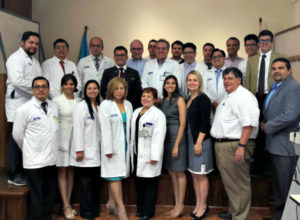The relationship between the Division of Nephrology at Washington University School of Medicine and the Guatemala Social Security Institute (IGSS) Renal Division has been officially upgraded. The two centers of nephrology, a Sister Renal Center Pair, are now at a B-level status, up from the introductory C-level.
 For the past several years, a group of Washington University researchers, residents, fellows and staff, in partnership with the IGSS hospital system and Roosevelt Hospital in Guatemala City, has been working to study MesoAmerican Nephropathy (MeN). MeN is an unexplained epidemic of chronic kidney disease prevalent on the Pacific coast of Latin America, particularly Guatemala, Nicaragua, El Salvador and Costa Rica. The disease mainly affects young and middle-aged male laborers working in agriculture, specifically in the sugarcane fields, and in other occupations that involve strenuous work and heat stress.
For the past several years, a group of Washington University researchers, residents, fellows and staff, in partnership with the IGSS hospital system and Roosevelt Hospital in Guatemala City, has been working to study MesoAmerican Nephropathy (MeN). MeN is an unexplained epidemic of chronic kidney disease prevalent on the Pacific coast of Latin America, particularly Guatemala, Nicaragua, El Salvador and Costa Rica. The disease mainly affects young and middle-aged male laborers working in agriculture, specifically in the sugarcane fields, and in other occupations that involve strenuous work and heat stress.
In 2015, the International Society of Nephrology (ISN) officially recognized the centers of nephrology at WU and IGSS as a Sister Renal Center Pair. The scientific and educational interchange between the divisions is led by Marcos Rothstein, MD, Professor of Medicine at Washington University and Vicente Sanchez Polo, MD, of the San Carlos University Renal Division (at IGSS) in Guatemala.

The two sister groups during a meeting last September held in Guatemala. Dr. Rothstein is in the back row, fifth from the left. In the front row, fourth from the right is Dr. Pooja Koolwal, Nephrology Fellow. Second from the right is Dr. Steve Bander, former WU fellow.
Sister center partners jointly enter the program at a C-level for a period of two years, during which time they receive basic annual funds from the ISN to develop and support training links between each other. If after two years the progress reports are satisfactory, the centers are eligible to be upgraded to B-level, which comes with significant financial support for the partnership.
An upgrade to A-level, the final stage, is reserved for those few partnerships that show to be most promising in the development of centers of excellence in their region.
“Over the last year, the research activity has continued and the educational and scientific exchange has been bolstered by Guatemalan physicians traveling for training at our institution and by nephrologists from Washington University School of Medicine going to Guatemala for field research and teaching,” says Dr. Rothstein. “Clinically, this relationship has been most impactful in the care of Guatemalan dialysis patients who now receive proper vascular access care derived from the training received at Washington University School of Medicine.”
Data from the ongoing research have been presented at the International Society of Nephrology and submitted for presentation at the annual meeting of the American Society of Nephrology (November 2017).
More on the history of the MeN project can be found here.